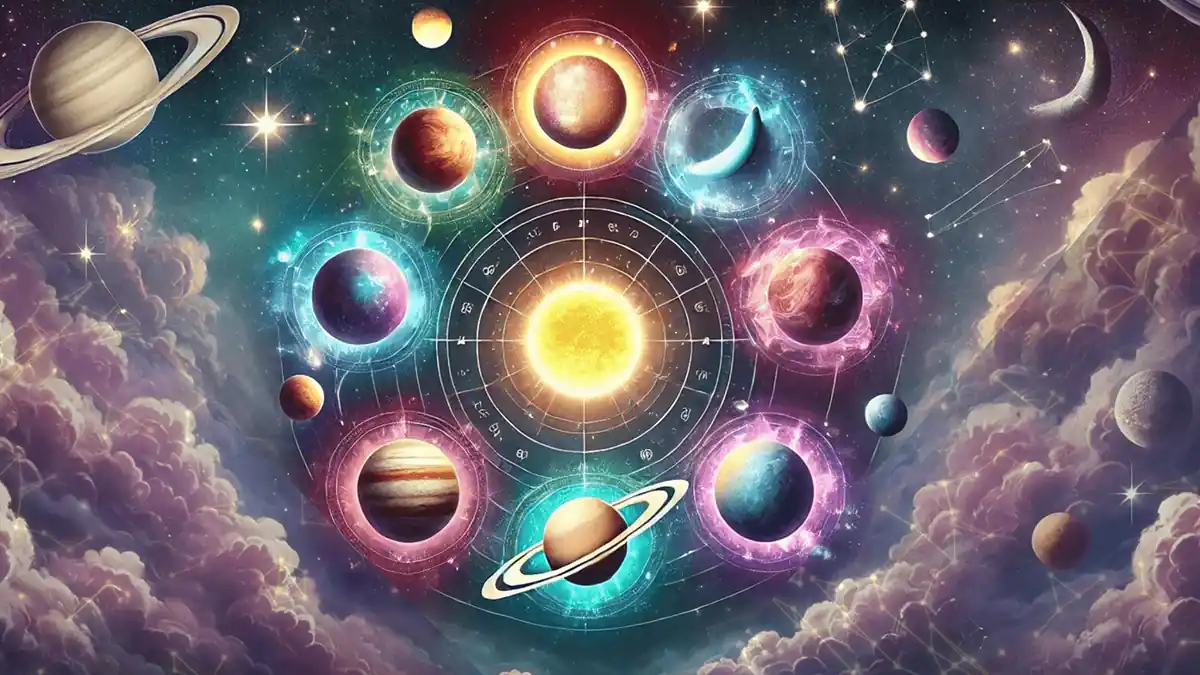Blog Contents
ToggleIn the grand scheme of the universe, the Grahas (Planets in astrology ) move in harmony, shaping the course of our lives according to Vedic astrology. These Grahas are not just distant celestial objects; they are powerful forces that influence different aspects of our personality, relationships, and daily experiences. Whether it’s through your Rashi (zodiac sign) or your Janma Kundali (birth chart), the planets play a vital role in guiding your journey. By understanding the role of each Graha, we can gain deeper insights into how they shape our career paths, personal growth, and relationships, ultimately helping us navigate the ups and downs of life.
Introduction
In Vedic astrology, planets, known as Grahas, play a pivotal role in shaping our lives. Each Planets in astrology holds unique significance and affects various aspects of an individual’s Janma Kundali (birth chart). By understanding the meaning of planets in astrology, we can gain insight into how they influence personality, relationships, and daily experiences. This blog explores the role of planets in astrology and how they impact zodiac sign interpretations, career, and relationships.

Concept of Planets in Astrology
The astrological planets are central to interpreting a person’s birth chart or Janma Kundali. The nine planets in astrology—Sun, Moon, Mars, Mercury, Jupiter, Venus, Saturn, Rahu, and Ketu—each symbolise distinct qualities and energies. Let’s dive into what each planet symbolises in Vedic astrology:
- Surya (Sun): The Sun represents the Atma (soul) and ego, symbolising vitality, leadership, and self-expression. In Vedic astrology, it plays a crucial role in determining one’s personality and status.
- Chandra (Moon): The Moon governs the Manas (mind) and emotions. It controls our moods and intuition, greatly influencing our emotional well-being.
- Mangal (Mars): Known for its fiery energy, Mars signifies courage, ambition, and assertiveness. It governs our drive to achieve goals and overcome challenges.
- Budha (Mercury): Mercury is the planet of intellect and communication. It influences our ability to think logically, make decisions, and express ourselves.
- Guru (Jupiter): Jupiter symbolises knowledge, wisdom, and spiritual growth. It is the karaka (significator) of wealth, expansion, and dharma (righteousness).
- Shukra (Venus): Venus is the planet of love, beauty, and harmony. It governs relationships, artistic inclinations, and material comforts.
- Shani (Saturn): Saturn is associated with discipline, responsibility, and karma. It teaches life lessons through hardship and perseverance, shaping one’s character through challenges.
- Rahu: Rahu represents worldly desires, illusions, and materialism. Its influence is often seen in sudden success, unconventional paths, and intense ambitions.
- Ketu: Ketu is the planet of spirituality, detachment, and past-life karma. It encourages spiritual growth and detachment from worldly attachments.
Understanding the role of planets in Rashi (zodiac) sign interpretations and their significations in astrology helps to analyze their impact on our lives, including personality traits, relationships, and career.

Understanding Planetary Transits and Their Impact
Planetary transits, or Gochara, refer to the movement of planets through the zodiac signs over time. These transits have a dynamic effect on how planets influence personality in astrology, impacting various life areas such as career, relationships, and emotional well-being. For instance, a Jupiter transit through a favorable house can bring growth, wisdom, and prosperity, while a Saturn transit might introduce challenges that require discipline and resilience.
Recognizing the role of planets in zodiac sign interpretations helps individuals anticipate changes and make informed decisions during different phases of life. The effect of transits also highlights the significance of planets in astrology and their meanings in real-time, providing guidance on how to navigate life’s opportunities and challenges.
Importance of Planetary Aspects in Astrology
Planetary aspects, or Drishti, refer to the angles formed by planets as they interact with each other in a Kundali. These aspects influence how the energies of the planets manifest in different areas of life. A favorable aspect, like Jupiter’s aspect on important houses, can enhance wisdom, growth, and opportunities. Conversely, a challenging aspect from Mars or Saturn can create conflicts, delays, or struggles.
These aspects are key to understanding the meaning of planets in astrology, as they reveal both the strengths and weaknesses in a person’s life. By studying planetary aspects, astrologers can predict how various life areas will develop and where challenges or opportunities may arise.
Know More about Importance of houses in vedic Astrology 👇:
Conclusion
The planets in astrology act as cosmic influencers that guide us through life’s journey. From shaping our personalities to affecting our career paths and relationships, each planet’s significance in astrology provides valuable insights into our lives. By understanding what each planet represents in astrology birth charts and how astrological planets influence daily life, we can harness this ancient wisdom to navigate challenges and embrace opportunities. This knowledge allows us to align with our true selves and make more informed choices, leading to a fulfilling and balanced life.
FAQs:
In astrology, planets symbolise different aspects of life and personality. For example, the Sun represents self and vitality, the Moon governs emotions, and Mars symbolizes energy and ambition. Each planet affects various traits and life events based on its position in a person’s birth chart.
The shadow planets in Vedic astrology are Rahu and Ketu. They don’t have physical existence but represent the lunar nodes. Rahu governs desires and material pursuits, while Ketu symbolizes spirituality and detachment, influencing karma and life lessons.
In Vedic astrology, Jupiter (Guru) and Saturn (Shani) are considered powerful planets. Jupiter represents wisdom, growth, and prosperity, while Saturn governs discipline, karma, and long-term challenges that shape one’s destiny.
Jupiter is regarded as the luckiest planet in astrology due to its association with abundance, success, and spiritual growth. Venus is also considered fortunate for bringing harmony, love, and material comforts.
The social planets, Jupiter and Saturn, influence our role in society. Jupiter promotes growth, optimism, and expansion in social and spiritual matters, while Saturn governs responsibility, discipline, and social structures, teaching valuable life lessons through challenges.








